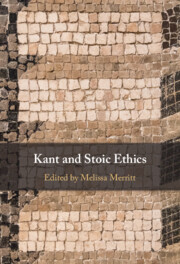Refine search
Actions for selected content:
51 results
3 - The Three Economic Enlightenments
- from Part I - Political Economy, Civil Economy, Moral Economy
-
- Book:
- The Three Economic Enlightenments
- Published online:
- 04 November 2025
- Print publication:
- 13 November 2025, pp 73-100
-
- Chapter
- Export citation
Chapter 10 - British Idealism
- from Part IV - Victorian Anti-naturalism
-
- Book:
- Modern Moral Philosophy in the Nineteenth Century
- Published online:
- 15 November 2025
- Print publication:
- 30 October 2025, pp 271-294
-
- Chapter
- Export citation
Chapter I - Introduction
-
- Book:
- Kant and the Supposed Right to Lie
- Published online:
- 18 July 2025
- Print publication:
- 28 August 2025, pp 1-13
-
- Chapter
- Export citation
Chapter 9 - A Sense of Duty
- from Part IV - Virtues of Indirect Caring
-
- Book:
- Attention to Virtues
- Published online:
- 25 July 2025
- Print publication:
- 14 August 2025, pp 216-237
-
- Chapter
- Export citation
Chapter 1 - Ethical Formulae in Ancient Stoicism
- from Part I - Law and ‘Duty’
-
-
- Book:
- Kant and Stoic Ethics
- Published online:
- 18 July 2025
- Print publication:
- 07 August 2025, pp 13-30
-
- Chapter
- Export citation
Chapter 4 - Kant’s Search for a Metaphysics of Morals
-
-
- Book:
- Kant's Lectures on Political Philosophy
- Published online:
- 18 July 2025
- Print publication:
- 07 August 2025, pp 66-83
-
- Chapter
- Export citation
4 - Carrying “The Nation’s Thousand-Jin Burden”
-
- Book:
- Grains of Conflict
- Published online:
- 23 August 2025
- Print publication:
- 31 July 2025, pp 150-183
-
- Chapter
- Export citation

Kant and Stoic Ethics
-
- Published online:
- 18 July 2025
- Print publication:
- 07 August 2025
12 - Common Law, Duties, and Harms
- from Part IV - Property in Common Law and Public Law
-
- Book:
- Natural Property Rights
- Published online:
- 17 April 2025
- Print publication:
- 24 April 2025, pp 221-244
-
- Chapter
- Export citation
11 - Owing God Worship
- from Part III - Normative Aspects
-
-
- Book:
- The Philosophy of Worship
- Published online:
- 09 January 2025
- Print publication:
- 23 January 2025, pp 189-208
-
- Chapter
- Export citation
Chapter 2 - A Theory of Glory
- from Part I - Glory
-
- Book:
- Glory, Humiliation, and the Drive to War
- Published online:
- 19 December 2024
- Print publication:
- 02 January 2025, pp 31-53
-
- Chapter
- Export citation
Duty and Deontology
-
- Journal:
- Canadian Journal of Philosophy / Volume 53 / Issue 4 / May 2023
- Published online by Cambridge University Press:
- 11 September 2024, pp. 289-300
-
- Article
-
- You have access
- Open access
- HTML
- Export citation
3 - Defining Duty
- from Part II - Social Groups
-
- Book:
- Making Sense of the Great War
- Published online:
- 11 April 2024
- Print publication:
- 18 April 2024, pp 119-159
-
- Chapter
- Export citation
10 - Christian Garve
- from Part III - The Reception of the Critique of Practical Reason
-
- Book:
- Kant's <i>Critique of Practical Reason</i>
- Published online:
- 31 January 2025
- Print publication:
- 28 March 2024, pp 246-249
-
- Chapter
- Export citation
The Doctor in Free Movement Law: Expertise, Duty, and Accountability
-
- Journal:
- Cambridge Yearbook of European Legal Studies / Volume 25 / December 2023
- Published online by Cambridge University Press:
- 21 December 2023, pp. 198-224
-
- Article
-
- You have access
- Open access
- HTML
- Export citation
17 - The Tokugawa Status Order
- from Part III - Social Practices and Cultures of Early Modern Japan
-
-
- Book:
- The New Cambridge History of Japan
- Published online:
- 15 January 2024
- Print publication:
- 23 November 2023, pp 567-602
-
- Chapter
- Export citation
2 - Conflict of Duties in Cicero’s De Officiis
- from Part I - The Framework of De Officiis
-
-
- Book:
- Cicero's ‘De Officiis'
- Published online:
- 15 June 2023
- Print publication:
- 29 June 2023, pp 42-60
-
- Chapter
- Export citation
1 - The Concept of Human Rights
- from Part I - The Concept of Human Rights and the Global History of an Idea
-
- Book:
- Mind and Rights
- Published online:
- 09 February 2023
- Print publication:
- 16 February 2023, pp 43-67
-
- Chapter
-
- You have access
- Open access
- HTML
- Export citation

Deontology
-
- Published online:
- 14 January 2023
- Print publication:
- 02 February 2023
-
- Element
- Export citation
2 - Insights from Ethical Theory
-
- Book:
- Ethics and Business
- Published online:
- 22 December 2022
- Print publication:
- 05 January 2023, pp 34-68
-
- Chapter
- Export citation
